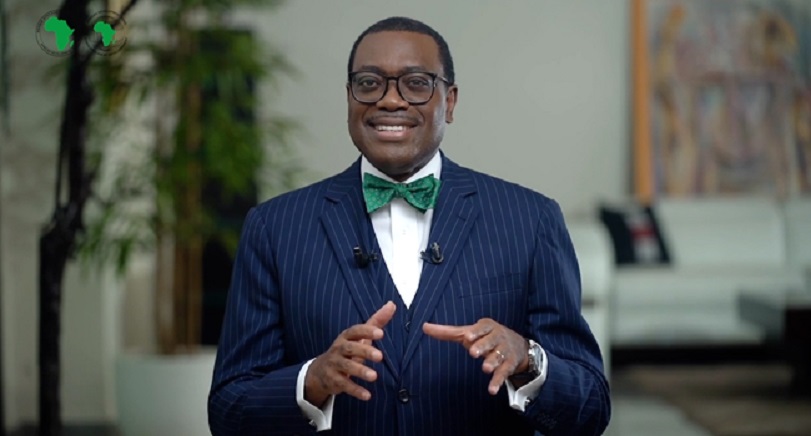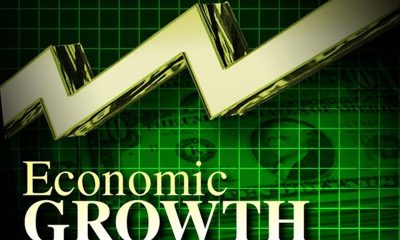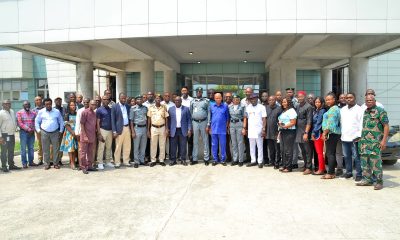Economy
Nigeria Must Ensure Stable Power Supply for Economic Growth—Adesina

By Adedapo Adesanya
The Nigerian government has been advised to address its power supply crisis if it intends to revamp the struggling economy.
The President of the African Development Bank (AfDB) Group, Mr Akinwumi Adesina, said this over the weekend during his lecture on Building a Global Nigeria to mark the 90th birthday anniversary of Nigeria’s fomeYakubu Gowon in Abuja.
He lamented that his country of origin loses about $29 billion annually due to a lack of reliable power supply, amounting to a 5.8 per cent loss in the nation’s Gross Domestic Product (GDP), noting that the major challenge facing Nigeria’s manufacturing industries was the high cost and unreliability of electricity supply.
The AfDB boss said that load shedding and the inconsistent availability of electricity had resulted in high and uncompetitive manufacturing costs.
According to him, most Nigerian manufacturing companies are providing their energy with a high dependence on generators, diesel and heavy fuel oil.
“It has been estimated by the IMF that Nigeria loses about $29 billion annually, that is 5.8 per cent of its GDP, due to a lack of reliable power supply.
“The report also indicates that Nigerians spend $14 billion yearly on generators and fuel. There is no other way to say it, lack of electricity is killing Nigerian industries,” he said.
He quoted the Manufacturers Association of Nigeria (MAN) as saying industries spent N93.1 billion on alternative energy in 2018.
“Today, no business can survive in Nigeria without generators. Nigeria has gas and crude oil in abundance, which can be vital means of generating electricity, yet, 86 million people live daily without electricity.
“Today, Nigeria is the number one country in the world in terms of the total number of people without electricity,” he said.
Mr Adesina said that it was a situation that called for the government’s attention so as to boost the country’s economy.
He said that to achieve a global Nigeria, the country must have universal access to electricity.
Highlighting AfDB‘s contributions, Mr Adesina said that the bank had invested massively in the power sector to support the implementation of Nigeria’s Power Sector Recovery Programme by providing 200 million dollars for the Nigeria Electrification Project.
“To support Nigeria and other African countries, the AfDB invests massively in the continent’s power sector.
“This is through the provision of 200 million dollars for the Nigeria Electrification Project, which is designed to fill the country’s electricity access gap.
“We have also invested $210 million in the Nigeria Transmission Project to strengthen the grid power evacuation and regional interconnection,” Mr Adesina said.
According to him, a major component of AfDB’s energy strategy is the launch of the Desert to Power initiative, a $20 billion initiative to provide electricity.
He said that the initiative would provide electricity for 250 million people across 11 countries of the Sahel, including Northern Nigeria.
He said that it was expected that Desert to Power would create the world’s largest solar zone.
“This initiative will draw lessons from successful projects already financed by the bank, including the Noor Ouarzazate solar PV power project in Morocco and the Ben Ban solar project in Egypt.
“The President of the World Bank Group, Ajay Banga and I made the decision that the two institutions will work together to connect 300 million Africans, including Nigerians, to electricity by 2030,” Mr Adesina said.
Economy
NGX RegCo Cautions Investors on Recent Price Movements

By Aduragbemi Omiyale
The investing public has been advised to exercise due diligence before trading stocks on the Nigerian Exchange (NGX) Limited.
This caution was given by the NGX Regulation Limited (NGX RegCo), the independent regulatory arm of the NGX Group Plc.
The advisory became necessary in response to notable price movements observed in the shares of certain listed companies over recent trading sessions.
On Monday, the bourse suspended trading in the shares of newly-listed Zichis Agro-allied Industries Plc. The company’s stocks gained almost 900 per cent within a month of its listing on Customs Street.
In a statement today, NGX RegCo urged investors to avoid speculative trading based on unverified information and to consult licensed intermediaries such as stockbrokers or investment advisers when needed.
It explained that its advisory is part of its standard market surveillance functions, as it serves as a measured reminder for investors to prioritise informed and disciplined decision-making.
The notice emphasised that the Exchange will continue to monitor market activities closely in line with its mandate to ensure a fair, orderly, and transparent market.
“NGX RegCo encourages all investors to base their decisions on publicly available information, including a thorough assessment of company fundamentals, financial performance, and risk profile,” a part of the disclosure said.
It reassured all stakeholders that the NGX remains stable, well-regulated, and resilient, saying the platform continues to foster an environment where investors can participate with confidence, supported by robust oversight and transparent market operations.
“Our primary responsibility is to maintain a level playing field where market participants can trade with confidence, backed by timely and accurate information.
“This advisory is a routine communication, reinforcing that sound fundamentals, not speculation, remain the foundation for sustainable investment outcomes. We are fully committed to preserving the integrity and stability of our market,” the chief executive of NGX RegCo, Mr Olufemi Shobanjo, stated.
Economy
Stronger Taxpayer Confidence, Others Should Determine Tax Reform Success—Tegbe

By Modupe Gbadeyanka
The chairman of the National Tax Policy Implementation Committee (NTPIC), Mr Joseph Tegbe, has tasked the Nigeria Revenue Service (NRS) to measure the success of the new tax laws by higher voluntary compliance rates, lower administrative costs, fewer disputes, faster resolution cycles, and stronger taxpayer confidence.
Speaking at the 2026 Leadership Retreat of the agency, Mr Tegbe said, “Sustainable revenue performance is built on trust and efficiency, not enforcement intensity,” emphasising that the legitimacy and predictability of the system are more critical than punitive measures.
He underscored that the country’s tax reform journey is at a critical juncture where effective implementation will determine long-term fiscal outcomes.
The NTPIC chief stressed that tax policy must serve as an enabler of governance, and should embody simplicity, equity, predictability, and administrability at scale.
These principles, he explained, foster voluntary compliance, reduce operational friction, and strengthen investor confidence. He warned that ad-hoc adjustments or policy drift could undermine reform momentum, unsettle businesses, and deter investment, which thrives on predictable rules rather than shifting announcements. Structured sequencing, clear transition mechanisms, and continuous feedback between policymakers and administrators are therefore critical to sustaining reform credibility.
Mr Tegbe further argued that revenue reform cannot succeed in isolation. Achieving sustainable gains requires a whole-of-government approach, leveraging robust taxpayer identification systems, integrated financial data, efficient dispute resolution, and harmonised coordination across federal and sub-national levels. This approach, he said, reduces leakages, eliminates multiple taxation, and reinforces confidence in the system.
He noted that the passage of four new tax laws marks only the beginning of a broader reform agenda, describing the initiative as a systemic recalibration of Nigeria’s fiscal architecture, rather than a routine policy update.
He further asserted that the true measure of success will be the credibility of implementation, not the design of the laws themselves.
The NRS, he noted, functions as the nation’s “Revenue System Integrator,” with outcomes reflecting the strength of an interconnected ecosystem that encompasses policy clarity, enforcement consistency, digital infrastructure, dispute resolution efficiency, and intergovernmental coordination.
Economy
NUPENG Seeks Clarity on New Oil, Gas Executive Order

By Adedapo Adesanya
The National Union of Natural and Gas Workers (NUPENG) has expressed deep concern over the Executive Order by President Bola Tinubu mandating the Nigerian National Petroleum Company (NNPC) Limited to remit directly to the federation account.
In a statement signed by its president, Mr William Akporeha, over the weekend in Lagos, the union noted that the absence of detailed public engagement had naturally generated tension within the sector and heightened restiveness among workers, who are anxious to know how the new directive may affect their employment, welfare and job security, especially as it affects NNPC and other major operations in the oil and gas sector.
It pointed out that the industry remained the backbone of Nigeria’s economy, contributing significantly to national revenue, foreign exchange earnings, and employment.
The NUPENG president affirmed that any policy shift, particularly one introduced through an Executive Order, has far-reaching consequences for regulatory frameworks, Investment decisions, operational standards, and labour relations within the sector.
According to him, “there is an urgent need for clarity on the scope and objectives of the Executive Order -What precise reforms or adjustments does it introduce? “Its implications for the Petroleum Industry Act -Does the Order amend, interpret, or expand existing provisions under PIA?
“Impact on workers and existing labour agreements-Will it affect job security, conditions of service, Collective Bargaining agreements or ongoing restructuring processes within the industry? “Effects on indigenous participation and local content development -How will it affect Nigerian companies and employment opportunities for citizens?”
He warned that without proper consultation and explanation, misinterpretations of the Executive Order may spread across the industry, potentially destabilising operations and undermining industrial harmony that stakeholders have worked hard to sustain.
“Though our union remains committed to constructive engagement, national development and stability of the oil and gas sector, however, we are duty-bound and constitutionally bound to protect the rights and welfare and job security of our members whose livelihoods depend on a clear, fair and predictable policy framework,” Mr Akporeha further stated.
-

 Feature/OPED6 years ago
Feature/OPED6 years agoDavos was Different this year
-
Travel/Tourism10 years ago
Lagos Seals Western Lodge Hotel In Ikorodu
-

 Showbiz3 years ago
Showbiz3 years agoEstranged Lover Releases Videos of Empress Njamah Bathing
-

 Banking8 years ago
Banking8 years agoSort Codes of GTBank Branches in Nigeria
-

 Economy3 years ago
Economy3 years agoSubsidy Removal: CNG at N130 Per Litre Cheaper Than Petrol—IPMAN
-

 Banking3 years ago
Banking3 years agoSort Codes of UBA Branches in Nigeria
-

 Banking3 years ago
Banking3 years agoFirst Bank Announces Planned Downtime
-

 Sports3 years ago
Sports3 years agoHighest Paid Nigerian Footballer – How Much Do Nigerian Footballers Earn
















